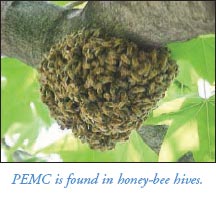Meetings and Events
Spring 2013
Vol. 8, Issue 1
Winter 2013
Vol. 7, Issue 2
Spring 2012
Vol. 7, Issue 1
Spring 2011
Vol. 6, Issue 1
Fall 2011
Vol. 6, Issue 2
Spring 2010
Vol. 5, Issue 1
Fall 2010
Vol. 5, Issue 2
Spring 2009
Vol. 4, Issue 1
Fall 2009
Vol. 4, Issue 2
Spring 2008
Vol. 3, Issue 1
Fall 2008
Vol. 3, Issue 2
Fall 2007
Vol. 2, Issue 2
Winter 2007
Vol. 2, Issue 1
Summer 2006
Vol. 1, Issue 2
Research Highlights
Natural Compounds Studied for Prevention of Colon Cancer
Limited information exists on the cellular mechanisms by which natural compounds may inhibit disease processes, including cancer. The lack of clear information presents a barrier for moving natural compounds into chemopreventive clinical trials.

Chinthalapally Rao, Ph.D., professor of Hematology and Oncology at the University of Oklahoma Health Sciences Center, is leading a study to understand the mechanisms of action of curcumin, found in the spice turmeric, and phenylethyl-3-methylcaffeate (PEMC), a compound found in honey-bee hives. Both products have been used in folk medicine to treat various diseases for thousands of years and have been shown to inhibit colon tumor formation in laboratory animal models.
Preliminary studies showed that these two compounds inhibit the metabolism of arachidonic acid (AA), a substrate of cyclooxygenase (COX) and lipoxygenase (LOX) - enzymes that produce tumor-promoting substances. Tumeric and PEMC also block the formation of adenocarcinomas in the colons of rats that are caused by azoxymethane (AOM), a known colon carcinogen.
In their NCI-funded investigation, the researchers used rat models to examine the effects of curcumin and PEMC on the expression and activity of enzymes known to be involved in different stages of AOM-induced colon carcinogenesis. The investigators found that curcumin and PEMC suppressed colon tumor growth, and PEMC also exerted an anti-angiogenic effect on colon tumors by preventing the formation of new blood vessels to feed the tumors.
Neither curcumin nor PEMC showed any toxicity or unwanted side effects in the animal models used in the studies. Human studies will be required however to determine if curcumin and PEMC inhibit colon tumor growth without the side effects seen with synthetic COX-2 inhibitors, such as celecoxib.
Recent Phase I clinical trial studies have shown that administration of curcumin at 3.6 grams per day produced no side effects and significantly decreased levels of a COX-2 metabolite in humans. Currently, Rao and colleagues are considering a Phase II clinical trial to test the effectiveness of curcumin as a preventive agent in individuals at high risk for colorectal cancer.
Study Examines Impact of Lifestyle Changes on
Breast Cancer Outcomes
For nearly three decades, breast cancer survivors have led a grassroots movement to involve patients more in their care and treatment. The result has empowered many women not only to survive their cancer, but to emerge with a greater sense of purpose, closer ties with other patients and women, and perhaps a different diet and lifestyle.
“However, there is little information on whether these changes actually impact their prognosis,” says Lawrence H. Kushi, Sc.D., associate research director at Kaiser Permanente in Oakland, California. “We wanted to do a large study that followed women from the time they are diagnosed, and examine whether their lifestyles may influence their cancer outcomes — including their risk of recurrence and survival rates. As far as we know, this will be the largest prospective cohort study ever conducted in breast cancer survivorship to look carefully at lifestyle changes and diet.”
The study is called “Pathways: A Study of Breast Cancer Survivorship”, and Kushi and his colleagues, starting in January 2006, will enroll more than 5,000 women soon after their initial diagnosis. Study participants are welcomed with a credo: “There are many ways to live with breast cancer. Each woman will make her own choices and walk her own path.” Nonetheless, Pathways participants will be exposed to information about diet, dietary supplements, herbal remedies, exercise, social networks, and other CAM interventions commonly used among breast cancer patients.
Researchers interview all women who join the study to develop baseline information on the use of CAM therapies, food intake, quality of life, and other lifestyle factors. “Pathways isn't an intervention study per se, so we're not asking study participants to make specific changes,” says Kushi. “But we know that many women in these circumstances do change their diet, may seek CAM treatments, and otherwise respond individually to the challenge of breast cancer. The study is designed to tell us whether the changes women do choose to make may have a bearing on their prognosis.”
For example, “We will be comparing women who consume relatively high amounts of fat compared to those who consume relatively low amounts of fat during the study time period,” Kushi adds.
The investigators are also collecting DNA from blood and tumor samples, and will be able to analyze specific genes for variants or damage, as well as those expressed in the tumor microenvironment. This should yield associations between certain genes and progression, as well as how certain genes may influence the effectiveness of conventional treatments, or modify the effect of lifestyle factors.





